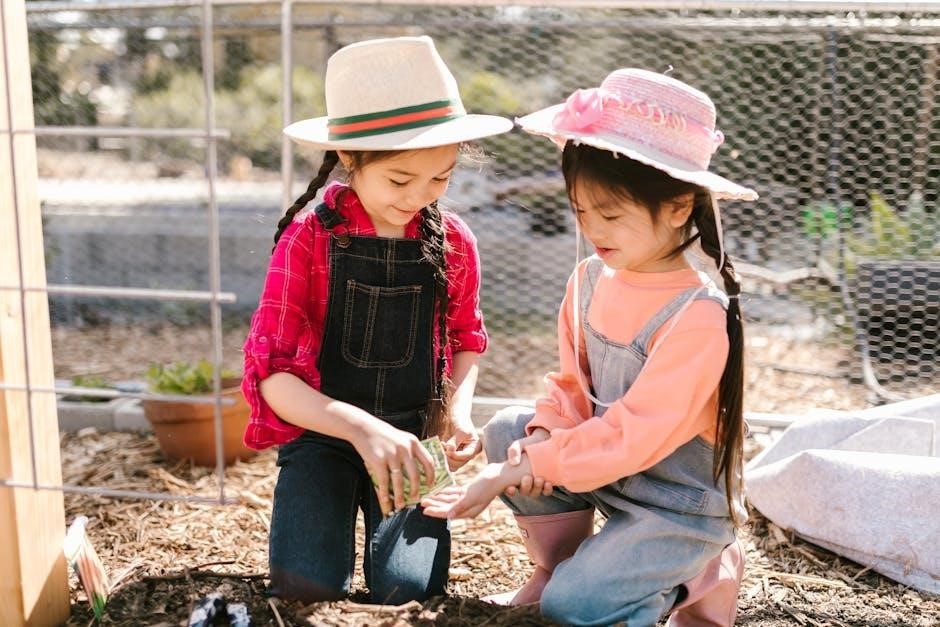Growing up is a transformative journey of self-discovery‚ emotional growth‚ and learning to navigate life’s challenges․ This guide offers insights and tips to help girls thrive during adolescence‚ fostering confidence‚ resilience‚ and a strong sense of identity․ From understanding physical changes to building meaningful relationships‚ this resource provides a supportive roadmap for young girls to embrace their unique journey with courage and grace․
Understanding the Journey of Adolescence
Adolescence is a dynamic journey marked by significant physical‚ emotional‚ and social changes․ For girls‚ this phase often brings unique challenges‚ such as navigating mood swings‚ self-esteem struggles‚ and peer pressure․ It’s a time of exploration‚ where identities are formed‚ and independence is sought․ Books like A Good Girl’s Guide to Murder offer relatable insights‚ helping girls process their experiences․ Personal growth emerges as they learn to embrace their individuality and cope with setbacks․ Mistakes become valuable lessons‚ fostering resilience․ Surrounding oneself with supportive relationships can ease this transition‚ helping girls build confidence and clarity for the future․ Adolescence is not just a stage—it’s a foundation for lifelong growth․
Why Self-Awareness is Key
Self-awareness is crucial for girls navigating the complexities of growing up‚ as it enables them to understand their emotions‚ strengths‚ and weaknesses․ By developing this trait‚ they can make informed decisions and build a strong sense of identity; Books like A Good Girl’s Guide to Murder highlight how self-awareness helps characters navigate challenges‚ offering valuable lessons․ Recognizing personal boundaries and emotions allows girls to communicate effectively and foster healthier relationships․ Self-awareness also empowers them to embrace their uniqueness and develop resilience against societal pressures․ Cultivating this mindset early on equips girls with the tools to thrive in adolescence and beyond‚ fostering confidence and self-acceptance․

Physical Changes During Puberty
Physical changes during puberty include growth spurts‚ breast development‚ and hormonal shifts․ These changes can be confusing but are a natural part of growing up․
Understanding Hormonal Shifts
Hormonal shifts during puberty trigger significant changes in a girl’s body․ Estrogen and progesterone levels rise‚ causing breast development‚ menstruation‚ and body fat redistribution․ These changes can lead to mood swings and emotional sensitivity‚ as hormones affect the brain․ Understanding these shifts helps girls anticipate and manage physical and emotional transitions․ Open conversations with trusted adults and education about bodily changes can reduce confusion and anxiety․ Tracking symptoms and maintaining a healthy lifestyle‚ including diet and exercise‚ can help navigate this phase smoothly․ Knowledge and support are key to embracing these natural transformations with confidence and resilience․
Navigating Body Changes
During puberty‚ girls experience significant body changes‚ including breast development‚ growth spurts‚ and the onset of menstruation․ These changes can be both exciting and overwhelming․ It’s important to embrace these transformations as natural and normal․ Girls should focus on self-acceptance and avoid comparing themselves to others․ Proper hygiene‚ such as using deodorant and wearing breathable clothing‚ can help manage body odor and skin changes․ Understanding menstrual cycles and using tools like period trackers can provide a sense of control․ Encouraging open conversations with trusted adults and seeking accurate information can alleviate fears and myths․ Self-care practices‚ like staying active and eating nutritiously‚ support overall health during this transition․
Hygiene and Self-Care Tips
Establishing a consistent hygiene and self-care routine is essential for girls during their growing years․ This includes daily showers‚ using deodorant to manage body odor‚ and washing hands frequently․ Skincare routines should focus on cleansing and moisturizing to maintain healthy skin․ Dental hygiene involves brushing twice a day and regular dental check-ups․ Additionally‚ keeping nails clean and wearing clean clothes fosters a sense of freshness and confidence․ Self-care extends to mental well-being‚ such as practicing mindfulness‚ staying active‚ and eating a balanced diet․ These habits not only promote physical health but also support emotional resilience and self-esteem during adolescence․

Emotional Growth and Well-being
Emotional growth during adolescence is vital for building resilience and self-awareness․ Girls learn to navigate mood swings‚ develop empathy‚ and cultivate healthy coping mechanisms for life’s challenges‚ fostering strong emotional well-being․
Managing Mood Swings
Managing mood swings is crucial for emotional balance during adolescence․ Girls can learn to identify triggers‚ practice mindfulness‚ and develop healthy coping mechanisms․ Encourage open conversations about feelings‚ and teach relaxation techniques like deep breathing or journaling․ Physical activity‚ such as walking or yoga‚ can also help regulate emotions․ It’s important to foster a supportive environment where girls feel safe expressing their feelings without judgment․ By teaching these strategies‚ girls can better navigate emotional ups and downs‚ building resilience and confidence․ This guidance helps them develop lifelong skills to handle stress and maintain emotional well-being․

Building Self-Esteem
Building self-esteem is essential for girls to develop a positive self-image and confidence․ Encourage girls to recognize their strengths and accomplishments‚ fostering a sense of pride in their abilities․ Teach them to practice affirmations and challenge negative self-talk․ Surrounding themselves with supportive friends and family can also boost their self-worth․ Encourage participation in activities they enjoy‚ helping them develop skills and a sense of achievement․ Celebrate their uniqueness and remind them that everyone has value․ By nurturing self-esteem‚ girls can develop resilience to face challenges and grow into confident‚ empowered individuals․ This foundation is vital for lifelong emotional well-being and success․
Coping with Peer Pressure

Coping with peer pressure is a critical skill for girls to master during adolescence․ It’s important to recognize when others are influencing decisions that may not align with personal values․ Encourage open conversations about the pressures they face and teach them to set clear boundaries․ Role-playing different scenarios can help build confidence in making independent choices․ Remind them that saying “no” is okay and that true friends respect their decisions․ Surrounding themselves with supportive peers who share similar values can also reduce the impact of negative pressure․ By fostering self-awareness and resilience‚ girls can navigate social challenges with confidence and make positive‚ empowered choices․

Building Strong Relationships
Building strong relationships involves open communication‚ empathy‚ and trust․ Girls should foster connections based on mutual respect‚ understanding‚ and shared values to create lasting‚ meaningful bonds with others․
Friendships: Making and Keeping
Making and keeping strong friendships is a vital part of growing up․ Girls can foster meaningful connections by being supportive‚ loyal‚ and genuine․ Shared interests and mutual respect form the foundation of lasting friendships․ Encourage open communication‚ actively listen‚ and show empathy to build trust․ Handling conflicts with kindness and understanding helps maintain relationships․ Avoid gossip or negative behaviors that can harm friendships․ By nurturing these connections‚ girls create a network of support and companionship that enriches their lives and helps them navigate life’s challenges with confidence and joy․
Family Dynamics: Understanding and Navigating
Understanding family dynamics is crucial for girls to navigate their relationships effectively․ Open communication and empathy form the foundation of healthy family bonds․ Setting boundaries while respecting individuality helps maintain harmony․ Girls should learn to express their feelings calmly and listen actively to others․ Navigating conflicts with patience and understanding fosters mutual respect․ Parents play a key role in guiding their daughters through challenges‚ offering support while encouraging independence․ By fostering a positive and supportive environment‚ families can help girls grow into confident‚ resilient individuals․ Strong family ties provide a lifelong source of love and strength‚ aiding personal growth and well-being․
First Crushes and Romantic Relationships
First crushes and romantic relationships are exciting yet challenging experiences for young girls․ These feelings mark a significant step in emotional growth‚ teaching valuable lessons about love‚ respect‚ and boundaries; Communication is key—expressing feelings honestly while listening to your partner fosters trust and understanding․ It’s important to prioritize mutual respect and shared values in any relationship․ Navigating these experiences with confidence and self-awareness helps build healthy patterns for future relationships․ Remember‚ it’s okay to take things slow and seek support from family or friends when needed․ Romantic relationships should enhance your life‚ not overshadow your personal growth or identity․

Academic and Future Planning

Academic and future planning empowers girls to set goals‚ explore career paths‚ and develop time management skills․ These steps prepare them for future success and personal growth․
Setting Goals for Education
Setting educational goals is crucial for creating a roadmap to success․ Start by identifying clear‚ achievable objectives‚ whether short-term or long-term․ Break down larger goals into smaller‚ manageable steps to maintain focus and motivation․ Celebrate progress along the way to stay encouraged․ Align goals with personal interests and strengths to foster a sense of purpose․ Regularly review and adjust goals to ensure they remain relevant and challenging․ Seeking guidance from mentors or teachers can provide valuable insights and support․ By setting and working toward educational goals‚ girls can build confidence‚ develop resilience‚ and lay a strong foundation for future achievements and personal growth․
Exploring Career Opportunities
Exploring career opportunities is an exciting part of growing up‚ allowing girls to discover their passions and strengths․ Start by assessing personal interests‚ skills‚ and values to identify potential career paths; Research industries‚ job roles‚ and required qualifications to gain clarity․ Seek advice from mentors‚ teachers‚ or professionals in fields of interest․ Engaging in internships‚ job shadowing‚ or volunteer work can provide hands-on experience and insights․ Utilize career counseling services or online platforms to explore options and create a plan․ Remember‚ career paths evolve‚ and it’s okay to adapt as interests and goals change․ Early exploration helps build confidence and sets the stage for future success and fulfillment․
Time Management and Productivity
Mastering time management and productivity is essential for balancing school‚ extracurricular activities‚ and personal life․ Start by setting clear goals and priorities‚ using tools like planners or digital apps to stay organized․ Break tasks into smaller‚ manageable steps to avoid overwhelm․ Learn to say “no” to non-essential commitments and minimize distractions‚ such as limiting screen time․ Practice the Eisenhower Matrix to focus on what’s truly important․ Schedule regular breaks to maintain energy and focus․ Building these habits early fosters discipline‚ efficiency‚ and a sense of accomplishment‚ laying a strong foundation for future success․ Consistency is key to making productivity a lifelong skill․
Mental Health and Self-Care

Mental health is crucial for overall well-being․ Recognize signs of anxiety or depression‚ practice mindfulness‚ and stay physically active․ Seek support from trusted adults and embrace self-compassion to thrive emotionally․
Recognizing Signs of Anxiety or Depression
Recognizing signs of anxiety or depression in girls is crucial for early intervention․ Common indicators include persistent sadness‚ mood swings‚ withdrawal from activities‚ and changes in appetite or sleep patterns․ Emotional symptoms may include feelings of hopelessness‚ irritability‚ or excessive worry․ Physical signs might involve headaches‚ stomachaches‚ or fatigue․ It’s important to encourage open conversations and create a supportive environment․ Professional help from counselors or therapists can provide tailored strategies to manage these emotions․ Teaching mindfulness‚ relaxation techniques‚ and healthy coping mechanisms can empower girls to navigate these challenges effectively and foster long-term emotional well-being․
Practicing Mindfulness and Relaxation
Practicing mindfulness and relaxation is essential for emotional well-being during adolescence․ Mindfulness involves being present in the moment‚ observing thoughts without judgment․ Techniques like deep breathing‚ meditation‚ and grounding exercises can help manage stress and anxiety․ Activities such as yoga or journaling can also promote relaxation․ Encourage girls to take short breaks‚ focus on their senses‚ and engage in calming routines․ Regular mindfulness practice can improve focus‚ reduce overwhelm‚ and foster a positive mindset․ By incorporating these habits into daily life‚ girls can better navigate life’s challenges with resilience and emotional balance‚ fostering a healthy and mindful approach to growing up․
The Importance of Physical Activity
Physical activity plays a vital role in promoting overall health and well-being during adolescence․ Regular exercise helps maintain a healthy weight‚ strengthens bones and muscles‚ and improves cardiovascular health․ It also boosts mood by releasing endorphins‚ reducing stress and anxiety․ For girls‚ staying active can enhance self-esteem and body confidence․ Activities like sports‚ dancing‚ or even walking can foster social connections and teamwork․ Encouraging girls to find enjoyable forms of exercise helps create a lifelong habit․ By prioritizing physical activity‚ girls can develop resilience‚ energy‚ and a positive outlook‚ laying a strong foundation for a healthy and balanced life as they grow․

Safety and Responsibility
Understanding personal safety‚ healthy decision-making‚ and financial literacy empowers girls to navigate life responsibly․ This section guides them in making informed choices and staying safe while building confidence․
Understanding Personal Safety
Personal safety is crucial for girls to feel secure and confident in their daily lives․ It involves trusting your instincts‚ setting boundaries‚ and being aware of your surroundings․ Learning to recognize unsafe situations and knowing how to respond is key․ This includes understanding consent‚ protecting personal information‚ and seeking help when needed․ Teaching girls self-defense techniques and how to stay vigilant in public places can empower them to take control of their safety․ Encouraging open conversations about safety and providing resources‚ such as trusted adults or helplines‚ helps build a sense of security and preparedness․ Empowering girls with knowledge fosters confidence and independence․
Financial Literacy for Teenagers
Financial literacy is essential for teenagers to manage money wisely and build a secure future․ Learning to budget‚ save‚ and spend responsibly helps girls develop healthy financial habits․ Understanding concepts like earning‚ saving‚ and investing empowers them to make smart decisions․ Encourage tracking expenses and setting financial goals‚ such as saving for education or emergencies․ Teaching the importance of avoiding debt and impulse purchases fosters long-term financial stability․ Introducing earning strategies‚ like part-time jobs or freelancing‚ can also enhance financial independence․ By mastering these skills‚ girls gain confidence and the tools needed to navigate the world of money effectively and responsibly․
Healthy Decision-Making
Healthy decision-making is a crucial skill for girls navigating adolescence․ It involves evaluating choices‚ considering consequences‚ and aligning decisions with personal values․ Encourage girls to think critically about short- and long-term impacts of their actions․ Teach them to seek advice from trusted adults or peers when unsure․ Practicing self-reflection and accountability helps build confidence in making wise choices․ Emphasize the importance of learning from mistakes and growing from experiences․ Foster a mindset that values responsibility and resilience‚ enabling girls to make decisions that promote their well-being and future success․ By mastering this skill‚ they can navigate life’s challenges with clarity and confidence․
